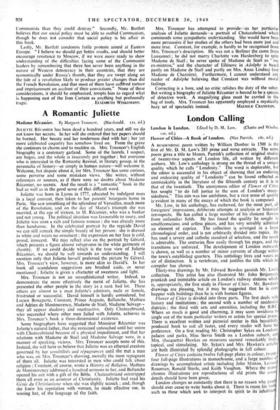A Romantic Juliette
Madame Recamier. By Margaret Trouncer. (Macdonald. t 2s. 6(1.) JULIETTE RECAMIER has been dead a hundred years, and still we do not know her secrets. In her will she ordered that her papers should be burned. Her beauty and her tenderness died with her ; her yet more celebrated coquetry has somehow lived on. From the grave she continues to charm and to madden us. Mrs. Trouncer's English biography is a centenary garland. Some of the laurels, I suspect, are bogus, and the whole is insecurely put together ; but everyone who is interested in the Romantic Revival, in literary gossip, in the personalia of history—or simply in human nature—will welcome it.
Welcome, but dispute about it, for Mrs. Trouncer has some curious, some perverse and some mistaken views. She writes, without references or sources, as if there were no doubts about Madame Recaniier, no secrets. And the result is a " romantic " book in the bad as well as in the good sense of that difficult word.
Juliette was born in Lyons in 1777, educated by indulgent nuns in a local convent, then taken to her parents' bourgeois home in Paris. She saw something of the splendour of Versailles, much more of the Revolution, and on the day of Marat's triumph she was married, at the age of sixteen, to M. Recamier, who was a banker and not young. The political situation was favourable to usury, and Juliette was soon a rich and famous woman ; she was already more than handsome. In the celebrated portrait by the regicide David we can still remark the simple beauty of her person: she is dressed in white and wears no ornament ; the expression on her face is cold, proud, innocent. We may reflect also on the portrait by Gerard, which presents a figure almost voluptuous in the white garments of chastity. If we could decide which is the true view of Juliette Recamier, we should be well towards an understanding. I will mention only that Juliette herself preferred the picture by Gerard. Mrs. Trouncer's view, however, is more akin to David's. In her book all scandalous suggestions are brushed aside,. or never mentioned ; Juliette is given a character of sweetness and light.
Mrs. Trouncer is not an unsophisticated writer. Indeed, to demonstrate the more effectively the merit of Juliette, she has presented the other people in the story as a rank bad lot. These others arc almost to a man Juliette's admirers, male or female, frustrated or successful. David himself is hardly considered, but Lucien Bonaparte, Constant, Prince Auguste, Ballanche, Mathieu and Adrien de Montmorency, Madame de Stael, Madame Salvage— they all appear shadowy and unattractive. Only Chateaubriand, who succeeded where other men failed with Juliette, achieves in Mrs. Trouncer's. book a three-dimensional existence.
Some biographers have suggested that Monsieur Recamier was Juliette's natural father, that she remained untouched until her union
with Chateaubriand because of a physical impediment, and that her relations with Madame de Steel -and Madame Salvage were, in a manner of speaking, vicious. Mrs. Trouncer accepts none of this.
Instead, she will have us believe that Juliette was an ethereal creature
governed by her sensibiliies and repugnances until she met a man who was, on Mrs. Trouncer's showing, morally the most repugnant
of them all. Juliette was interested in men who could talk about
religion ; Constant, of course, wrote a History of Religion, Mathieu de Montmorency addressed a hundred sermons to her, and Ballanche opened his suit with a gift of the Bible. Chateaubriand outstripped them all even as an amateur of Christianity. Juliette had read his Genie du Christianisme when she was slightly seasick ; and, though she knew his reputation with women, he made effective use, in wooing her, of the language of the faith. Mrs. Trouncer has attempted to provide—as her particular analysis of Juliette demands—a portrait of Chateaubriand which commands some sympathetic understanding. She would have been more persuasive if her studies of the others had been more just and more true. Constant, for example, is hardly to be recognised from Mrs. Trouncer's description. He was not a Berliner (he came from Lausanne) ; he did not marry Charlotte von Hardenberg to spite Madame de Stael ; he never spoke of Madame de Stael as " my ex-mistress," and the character of BIlanore in Adolphe is bases partly on Madame de Stael and partly on Mrs. Anna Lindsay (not Madame de Charriere). Furthermore, I cannot understand any reader of Adolphe believing that Constant was without moral feelings.
Correcting is a bore, and no critic relishes the duty of the usher. But writing a biography of Juliette Recamier is bound to be a species of detective work. A magnifying glass must be carried in the bag of tools. Mrs. Trouncer has apparently employed a mystically






























 Previous page
Previous page